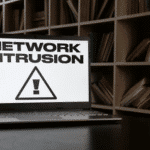
A Darker Turn: Fred Hutch Data Breach Escalates with Swatting Threats to Patients
January 23, 2024
Fortressing Your Network: Proactive Techniques to Thwart Intrusions Before They Strike
January 25, 2024Phishing attacks have long been a staple of the cybercriminal’s arsenal, evolving from clumsy bait-and-switch emails to sophisticated scams that can deceive even the most cautious individuals. But the latest weapon in their ever-expanding armory is adaptive phishing, a breed of attack that raises the bar in terms of both effectiveness and difficulty to detect.
What is Adaptive Phishing?
Unlike traditional phishing campaigns that cast a wide net with generic lures, adaptive phishing tailors its approach to each individual target. This personalization is achieved through various means, including:
- Data Breaches: Hackers leverage stolen information like usernames, passwords, and purchase history to craft emails that appear incredibly believable and relevant to the recipient. Imagine receiving an email from your bank about suspicious activity on your account, mentioning the exact amount of your recent grocery purchase.
- Social Media Stalking: Cybercriminals scour social media platforms to gather personal details and interests, which are then woven into the phishing narrative. An email claiming to be from a long-lost friend or offering a discount on a product you recently mentioned online can be highly convincing.
- Real-Time Interaction: Some adaptive phishing campaigns employ sophisticated algorithms that analyze the recipient’s response in real-time. If you hesitate on a suspicious link, the email might adapt its tone to become more urgent or apologetic. This dynamic interaction further blurs the lines between genuine communication and malicious intent.
The Consequences of Adaptive Phishing
The consequences of falling victim to an adaptive phishing attack can be dire:
- Financial Loss: Phishing emails often aim to steal financial information like credit card numbers or bank account details. This can lead to identity theft, unauthorized transactions, and significant financial losses.
- Data Breach: Phishing scams can be used to install malware on your device, which can then be used to steal sensitive data like passwords, emails, and even files. This information can be used for further attacks or sold on the dark web.
- Reputational Damage: Businesses can suffer reputational damage if their employees fall victim to phishing attacks and sensitive information is leaked. This can lead to lost customers, decreased trust, and legal repercussions.
Adapting to the Adaptive Threat
So, how can we defend ourselves against this ever-evolving threat? Here are some key strategies:
- Be Skeptical: No matter how legitimate an email appears, always be cautious about clicking on links or attachments. Hover over links to see the actual destination URL before clicking.
- Double-Check the Sender: Scrutinize the sender’s email address and name for any inconsistencies. Legitimate companies will rarely use misspelled domains or generic email addresses.
- Verify Information Independently: Don’t rely on the information provided in the email. Contact the sender directly through a trusted channel (phone number listed on their official website) to verify the message.
- Beware of Urgency: Phishing emails often create a sense of urgency to pressure you into making a hasty decision. Take your time and think critically before responding.
- Use Strong Passwords and Enable Two-Factor Authentication: Never reuse passwords and implement two-factor authentication wherever possible to add an extra layer of security.
- Install Anti-Phishing Software: Reputable anti-virus and anti-malware software can help detect and block phishing attempts.
- Stay Informed: Keep yourself updated on the latest phishing tactics and scams. Security blogs and news outlets are valuable resources for staying ahead of the curve.
Remember, the best defense against adaptive phishing is awareness and vigilance. By understanding how these attacks work and employing the necessary precautions, we can protect ourselves and our loved ones from becoming victims of this ever-evolving cybercrime.
Let’s join the fight against adaptive phishing and make the internet a safer place for everyone. Share this post and spread the word!
#AdaptivePhishing #Cybersecurity #StaySafeOnline #InfoSec #TechTalk
Additional Resources:
- Anti-Phishing Working Group: https://apwg.org/trendsreports/
- National Cyber Security Alliance: https://staysafeonline.org/
- Federal Trade Commission: https://www.ftc.gov/
By working together, we can create a more secure digital future!




